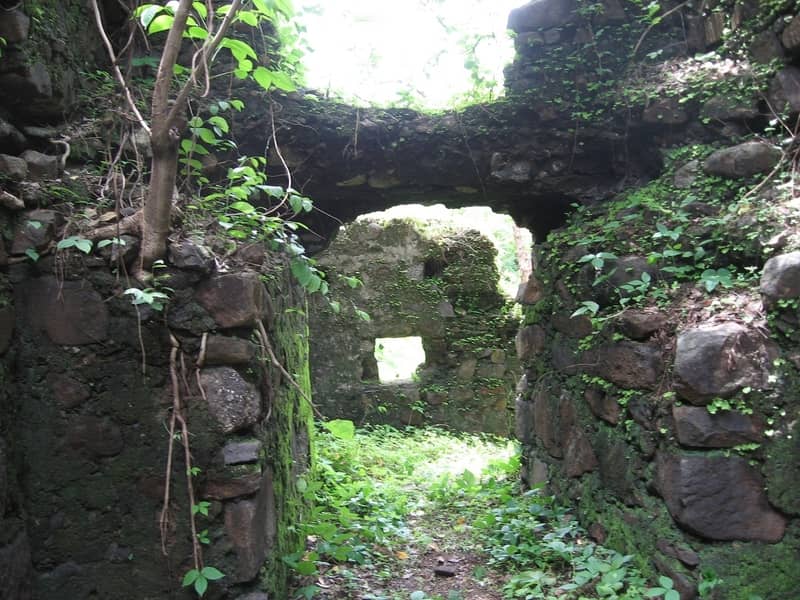If you’re seeking the perfect spot to enjoy the company and conversation with your partner in Navi Mumbai, look no further. This area has a lot to offer couples such as stunning parks, romantic waterfalls, boat rides, sunset spots and much more.
So if you’re looking for a romantic place to take your sweetheart, our list of options below will surely impress. Here are the 12 places to visit in Navi Mumbai for couples.
1. Aristo Spa

Aristo Spa offers couples massages (source)
If you want to unwind and relax with your partner, there’s nothing better than a couple’s massage. With the tranquil environment, stress free zone and deep massages, it makes for the perfect date with your partner. Try their wraps and their yoga massages that will recharge the both of you. The average price of a massage here is Rs. 2000.
- Where: Four Points by Sheraton, Sector 30A, Vashi
- Timing: 10 am to 8 pm
Suggested to Read : Top 16 Most Romantic Places in Mumbai
2. The Roof Top

Enjoy the beautiful views with your partner at this rooftop eatery (source)
Locals consider it one of the most romantic restaurants in Vashi. A perfect option for a special occasion, this rooftop eatery offers a stunning view from the top, live music, a pool side view and of course, candle light which set the romantic mood. The food is good and they have a heady selection of cocktails as well.
- Where: Opposite Mafco Market, Vashi
- Timing: 4.30 pm to 1 am
3. West 1

West 1 at The Park (source)
Want to really impress your beau with a fine meal? Then head to West 1 at the luxurious The Park hotel. They do great takes on Indian food, with the option of a buffet or a la carte. A wide selection of alcohols and an extensive wine cellar make this the perfect place for date night.
- Where: CBD, Belapur
- Timing: 7.30 pm to 11.30 pm
Also Read : Places to Visit Near Mumbai within 100 km
4. Kharghar Golf Course

For a fun date that is also romantic visit this golf course (source)
For a cute and romantic date, take your partner to the golf course. With the huge expanse of greenery and clean air, it makes for a great spot to have some fun and bond. Entry fee is Rs. 100 and you can rent clubs and golf balls here and try your hand at this sport, before enjoying a fancy meal. A date here will set you back around Rs. 1000.
- Where: Kharghar, Navi Mumbai
- Timing: 6.30 am to 6.30 pm
5. 70 Beans

70 Beans in Sanpada (source)
Wondering where to go on a first date? Well, you can’t go wrong with any coffee place. But 70 Beans isn’t just any coffee place. It’s the best in Navi Mumbai, by most estimates. They’ve also got live music, a pool table and free Wi-Fi! And then there’s the food and coffee. A class apart!
- Where: Sanpada, Navi Mumbai
- Timing: 9.30 am to 10.30 pm
Also Read : 22 Pubs, Clubs & Other Places Mumbai Is Famous For
1. Palm Beach Road

Palm Beach Road, Navi Mumbai (source)
This long stretch of road, around 10 kilometres, in an upmarket area of Vashi and Belapur is where a lot of couples go to hang out. There are several good restaurants in the immediate vicinity and it’s common for people to stop their cars and bikes around and spend a few quiet moments.
- Where: Vashi, Navi Mumbai
- Timing: Early mornings and evenings are best
2. Central Park

Central Park is the perfect place to escape to with your partner (source)
This is one of Asia’s largest parks and is considered to be a growing tourist attraction of Navi Mumbai. This huge space is spread across 80 hectares and includes a number of fun activities that couples can enjoy including water sports, amusement rides and walking trails.
For a romantic walk, check out the botanical gardens or just enjoy time with your sweetheart at the amphitheatres and recreation areas. Great for adventurous couples.
- Where: Sectors 22, 23 & 24, Kharghar, Navi Mumbai
- Timing: 6 am to 8 am & 5 pm to 8 pm
Also Read : The Top 12 National Parks In Mumbai For Nature Lovers
3. Wonder Park

For a fun-filled and romantic date, spend a few hours at Wonder Park (source)
You and your sweetheart will have a great time in this park and bring out your inner child. Here you can enjoy a great deal of rides, hang out at the amphitheatre or take pictures with your partner at the replicas of the seven wonders of the world. This is a great place where you can laugh, relax and unwind with your sweetheart. A fun day for you and your sweetheart.
- Where: Sector 19A, Nerul, Navi Mumbai
- Timing: 6 am to 12 pm & 3 pm to 9 pm (Closed on Monday)
4. Rajiv Gandhi Joggers Park

Rajiv Gandhi Joggers Park is a romantic spot for couples (source)
This romantic park runs around a water reservoir and is a lovely place to check out with your better half. Here, you can enjoy a peaceful walk at sunset as well as boat rides and other fun water activities. It is one of the better parks to visit for some much needed peace and quiet, and to share tender moments with your beloved. A romantic spot when the sun is setting.
- Where: Sector 10A, Juhu Chowpatty, Navi Mumbai
- Timing: 5.30 am to 9 pm
Suggested to Read : 10 Water Parks in Mumbai To Beat The Heat
5. Sagar Vihar Garden

Sagar Vihar Garden is a good place to watch the sunrise (source)
If you are visiting Belapur, then do make it a point to visit this garden with your partner if you’re looking for a romantic spot to hang out. This lush green garden includes a walking track as well as a duck pond you can sit by that is surrounded by beautiful mango trees. It’s the best on a Sunday morning or in the evening to watch the sunset.
- Where: Belapur Town, Navi Mumbai
- Timing: 6.30 am to 10 am & 5 pm to 8pm
- Best for: Bird spotting and catching the sunrise with your partner
6. Mango Garden

The Mango Garden is a nice hangout spot for couples (source)
If you are visiting Belapur, then do make it a point to visit this garden with your partner if you’re looking for a romantic spot to hang out. This lush green garden includes a walking track as well as a duck pond you can sit by that is surrounded by beautiful mango trees. It’s the best on a Sunday morning or in the evening to watch the sunset.
Where: Belapur Town, Navi Mumbai
Timing: 6.30 am to 10 am & 5 pm to 8pm
Best for: Bird spotting and catching the sunrise with your partner
1. Karnala Bird Sanctuary

The lush greenery provides a scenic and romantic backdrop (source)
This bird sanctuary is situated at the bottom of the Karnala Fort and was established in 1968. It boasts over 150 species of birds and is a peaceful place to enjoy a romantic date. Do make sure you carry your camera as here you can spot the golden backed woodpecker and heart-spotted woodpecker, among others. It’s nice to visit during the winter as the weather is good. Catch the sunrise here for a beautiful sight.
- Where: Panvel Taluka
- Timing: 7.30 am to 6 pm
2. Pandavkada Falls

The best time to visit these falls with your partner is during the monsoon (source)
With its picturesque backdrop of the waterfall and lush greenery, Pandavkada Falls is one of the best spots for a romantic break with your partner. The waterfall is about 350 metres high and hits the rocks in a sharp stream. You can enjoy a picnic here among nature but it’s best to give swimming a skip as it can be dangerous. The best time to visit is during the monsoon.
- Where: Kharghar, Navi Mumbai
- Timing: Open 24 hours but it is best enjoyed between 7 am and 6 pm
Also Read : The 12 Best Amusement Parks in Mumbai For Some Family Fun
3. Nerul Lake

Nerul Lake offer stunning views in the early morning and night making it a romantic area (source)
This lake is one of the most relaxing places you can visit in Navi Mumbai. There is a jogging track around it, so do plan a walk with your partner around sunrise or sunset as the view adds to the romance. Since it is very large, it doesn’t get overcrowded which means you can have your privacy as well.
- Where: Seawoods Lake, Nerul
- Timing: Open 24 hours but it is best enjoyed between 7 am and 6 pm
4. Belapur Fort

The Scenic Belapur Fort (source)
If you and your sweetheart want to take in history as you enjoy each other’s company then visit this fort. Here you can walk around the ruins or even just have a picnic. It can get a little crowded on the weekend so try to head there early if you want a little peace and quiet. It’s best to come here by public transport.
- Where: Sector 32, Seawoods, Navi Mumbai
- Timing: The best time to visit is 6 am to 10 am & 4 pm to 7 pm
These are some of the most romantic places in Navi Mumbai where you can unwind with your partner. If you’re looking for a relaxing massage, a day trip or simply to watch the sunset, these places are a must visit for a romantic date. Got any questions or need clarifications about these places? Let us know in the comments.
Book budget-friendly and safe Treebo hotels in Mumbai now!
Checkout the treebo hotels in Hotels near Nmims University Mumbai,Hotels near Seven Hills Hospital Mumbai,3 Star Hotels near Mindspace Malad Mumbai,Hotels near Mithibai College Mumbai,3 Star Hotels near Malad Railway Station Mumbai,3 Star Hotels in Khar West Mumbai,Hotels near Kopar Khairane Railway Station Mumbai,3 Star Hotels in Marol Maroshi Road Mumbai,Couple Friendly Hotels in Malad Mumbai,Couple Friendly Hotels in Powai Mumbai,Couple Friendly Hotels near Bandra Kurla Complex Bkc Mumbai.























